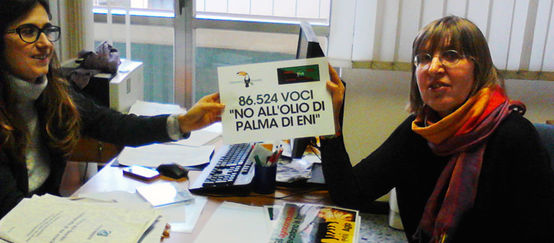Oil giant threatens 180,000 hectares of rainforest
 © Feri Irawan / Montage Rettet den Regenwald
© Feri Irawan / Montage Rettet den Regenwald
Italian oil and gas corporation Agip-Eni is building a biofuel refinery near Venice. Crude palm oil is about to be imported from Southeast Asian palm oil plantations. The capacity of 500,000 tons of biodiesel requires the deforestation of 180,000 hectares of rainforest. Please sign our petition to Agip-Eni and the Italian government.
News and updates Call to actionTo: Government of Italian Republic, Eni S.p.A.
“Stop the construction of the biofuel refinery.”
While the European Union is still discussing its biofuels policy, Italian Agip-Eni is already building a refinery that will produce biodiesel based on palm oil. “The refinery in Marghera will be modified for the production of advanced biodiesel,” Eni’s research director James Rispoli told Italian journalists. “The production will be based on crude palm oil, shipped to us from Indonesia and Malaysia.” Eni will fulfill the EU requirements forcing all refineries to meet a binding minimum target of 10% for the biofuel quota by 2020. The first palm oil will arrive in Venice in 2014.
The investment of approximately 100 million euros is needed to convert the refinery into one that produces advanced biodiesel. The production capacity will allow Eni to manufacture 500,000 tons of biofuels. Partly government-owned Eni also operates five other refineries and does business in more than 90 countries. In Europe, 6,384 filling stations are run by Agip-Eni.
Last year, 1.9 million tons of palm oil were added to diesel fuel in the EU – in addition to millions of tons of equally harmful rapeseed and soybean oils. The plantations needed to produce the palm oil cover an area of 700,000 hectares, or 2,700 square miles – land that until recently was still rainforest and the habitat of 5,000 endangered orangutans.
The Italian government owns approximately one third of Eni’s shares. Please tell the Italian government and Eni to stop all imports of palm oil. Join us in demanding an end to biofuels.
BackgroundYou can send an e-card here: http://www.rainforest-rescue.org/ecard/send/ecard-eni
Biofuels in the EU
The European Union has announced a mandatory biofuel quota in the traffic sector of 10%. However, the intention to save our climate with supposedly green agrofuels is leading to an increasing demand of palm oil. Despite the fact that its production entails the clear-cutting of rainforest land, the EU has classified palm oil as sustainably produced. Labels issued by the RSPO do not guarantee the sustainability of palm oil, however.
Palm oil and soybean oil are the cheapest vegetable oils on the market. With a combined market share of nearly 90 percent, Malaysia and Indonesia are the two largest palm oil producers – and are also responsible for the most extensive destruction of rainforest. The growing demand for palm oil also leads to the forced resettlement of forest dwellers and therefore to conflicts.
Moreover, biofuel production also consumes huge quantities of water, as well as fertilizers and pesticides that pollute the environment and adversely impact human health. Even the findings of scientific studies undertaken on behalf the European Commission show that biodiesel from palm, soybean and rapeseed oil causes more greenhouse gas emissions than fossil diesel fuel.
It is essential that we put an end to biofuels. The one-sided business interests of the biofuels industry are firmly entrenched, however. Biofuels are currently subsidized to the tune of 10 billion euros in the EU alone. Eni is Italy’s largest corporation and clearly profiting from the present political situation.
Today, palm oil accounts for over a third of Italy’s biofuels, as Greenpeace reports.
Crude materials for the production of EU "biofuels" in 2012 (total volume: 9.4 million tons)
Rapeseed oil: 5.4 million tons (57%)
Palm oil: 1.9 million tons (20%)
Soybean oil: 0.5 million tons (5%)
Sunflower oil: 0.1 million tons (1.1%)
Tallow and grease (slaughterhouse waste): 0.5 million tons (5.3%)
Recycled oils ("chip fat"): 1 million tons (10.6%)
Palm oil usage for "biodiesel" in the EU
2006: 0.4 million tons
2012: 1.9 million tons
Increase: 365%
To: Government of Italian Republic, Eni S.p.A.
Ladies and Gentlemen,
To my great consternation, I have learnt that Eni is modifying its refinery in Venice to accommodate crude palm oil that will be imported from Indonesia and Malaysia.
In Southeast Asia, large areas of rainforest are being converted into palm oil plantations, destroying habitats of orangutans and other species. The refinery with its capacity of 500,000 tons of palm oil each year requires an area under cultivation of 180,000 hectares. The deforestation of an area of that size means that around 1,200 orangutans will lose their habitat and and face certain death.
Furthermore, the construction of Eni’s biofuel refinery close to Venice is irresponsible and a potential environmental disaster. It needs to be stopped immediately.
Sincerely,
The issue – rainforest on our dinner tables and in our fuel tanks
At 66 million tons annually, palm oil is the most commonly produced vegetable oil. Its low world market price and properties that lend themselves to processed foods have led the food industry to use it in half of all supermarket products. Palm oil can be found in frozen pizzas, biscuits and margarine, as well as body creams, soaps, makeup, candles and detergents.
Few people realize that almost half of the palm oil imported into the EU is used as biofuel. Since 2009, the mandatory blending of biofuels into motor vehicle fuels has been a major cause of deforestation.
Oil palm plantations currently cover more than 27 million hectares of the Earth’s surface. Forests and human settlements have been destroyed and replaced by “green deserts” containing virtually no biodiversity on an area the size of New Zealand.
The impact – suffering and death in producer countries, climate havoc
The warm, humid climate of the tropics offers perfect growth conditions for oil palms. Day after day, huge tracts of rainforest in Southeast Asia, Latin America and Africa are being bulldozed or torched to make room for more plantations, releasing vast amounts of carbon into the atmosphere. As a consequence, Indonesia – the world’s largest producer of palm oil – temporarily surpassed the United States in terms of greenhouse gas emissions in 2015. With their CO2 and methane emissions, palm oil-based biofuels actually have three times the climate impact of traditional fossil fuels.
Palm oil is not only bad for the climate: As their forest habitat is cleared, endangered species such as the orangutan, Borneo elephant and Sumatran tiger are being pushed closer to extinction. Smallholders and indigenous people who have inhabited and protected the forest for generations are often brutally driven from their land. In Indonesia, more than 700 land conflicts are related to the palm oil industry. Human rights violations are everyday occurrences, even on supposedly “sustainable” and “organic” plantations.
As consumers, we are largely unaware of these broader issues, yet our daily palm oil consumption also impacts our health: refined palm oil contains large amounts of harmful fatty acid esters that are known to damage DNA and cause cancer.
The solution – a revolution on our dinner tables and in our fuel tanks
Only 70,000 orangutans still roam the forests of Southeast Asia, yet the EU’s biofuels policy is pushing them to the brink of extinction. Every new plantation on Borneo is destroying a further piece of their habitat. Stepping up the pressure on policymakers is a must if we want to save our tree-dwelling kin. Apart from that, however, there is still a lot we can do in day-to-day life.
Follow these simple tips to recognize, avoid and combat palm oil:
- Enjoy a home-cooked meal: Use your imagination: why not try almond-coconut-pear biscuits? Or pizza with potato and rosemary? A meal cooked from fresh ingredients beats processed foods containing palm oil every time. Oils such as sunflower, olive, rapeseed or flaxseed are ideal for cooking and baking.
- Read labels: As of December 2014, labeling regulations in the EU require food products to clearly indicate that they contain palm oil. However, in the case of non-food items such as cosmetics and cleaning products, a wide range of chemical names may still be used to hide the use of palm oil. A quick check of your favorite search engine will turn up palm oil-free alternatives, however.
- Remember that the customer is king: Ask your retailers for palm oil-free products. Write product manufacturers and ask them why they aren’t using domestic oils. Companies can be quite sensitive to issues that give their products a bad name, so inquiring with sales staff and contacting manufacturers can make a real difference. Public pressure and increased awareness of the problem have already prompted some producers to stop using palm oil.
- Sign petitions and write your elected representatives: Online campaigns put pressure on policymakers responsible for biofuels and palm oil imports. Have you already signed all of Rainforest Rescue’s petitions?
- Speak out: Protest marches and creative action on the street raise public and media awareness of the issue, which in turn steps up the pressure on policymakers.
- Leave your car at home: Whenever you can, walk, ride a bicycle or use public transport.
- Be informed and inform others: Big Business and governments would like us to believe that biofuels are good for the climate and that oil palm plantations are sustainable. Spread the word – share this information with your family and friends and encourage them to rethink their consumption habits. It’s in our hands!














 Recent successes
Recent successes